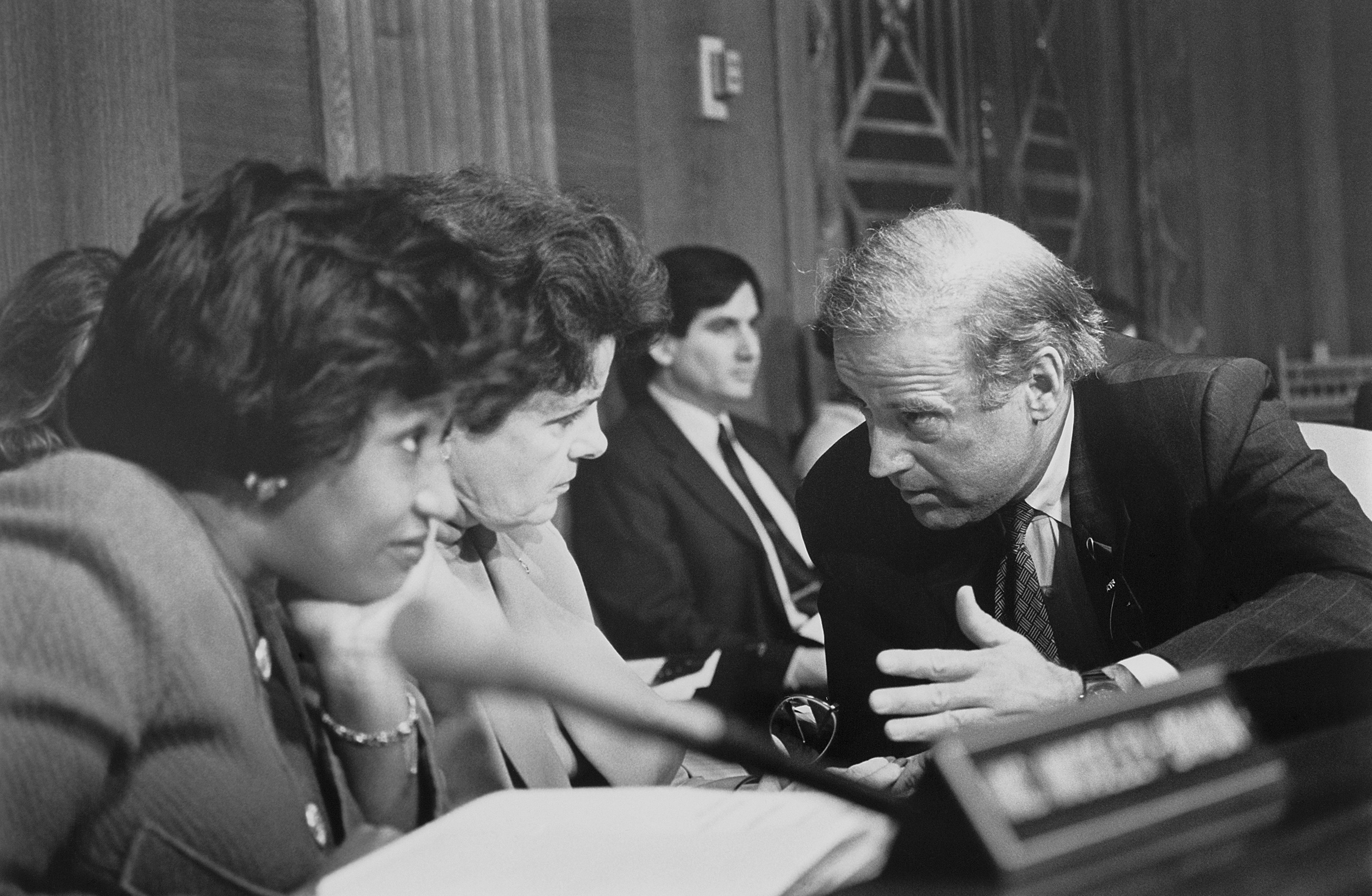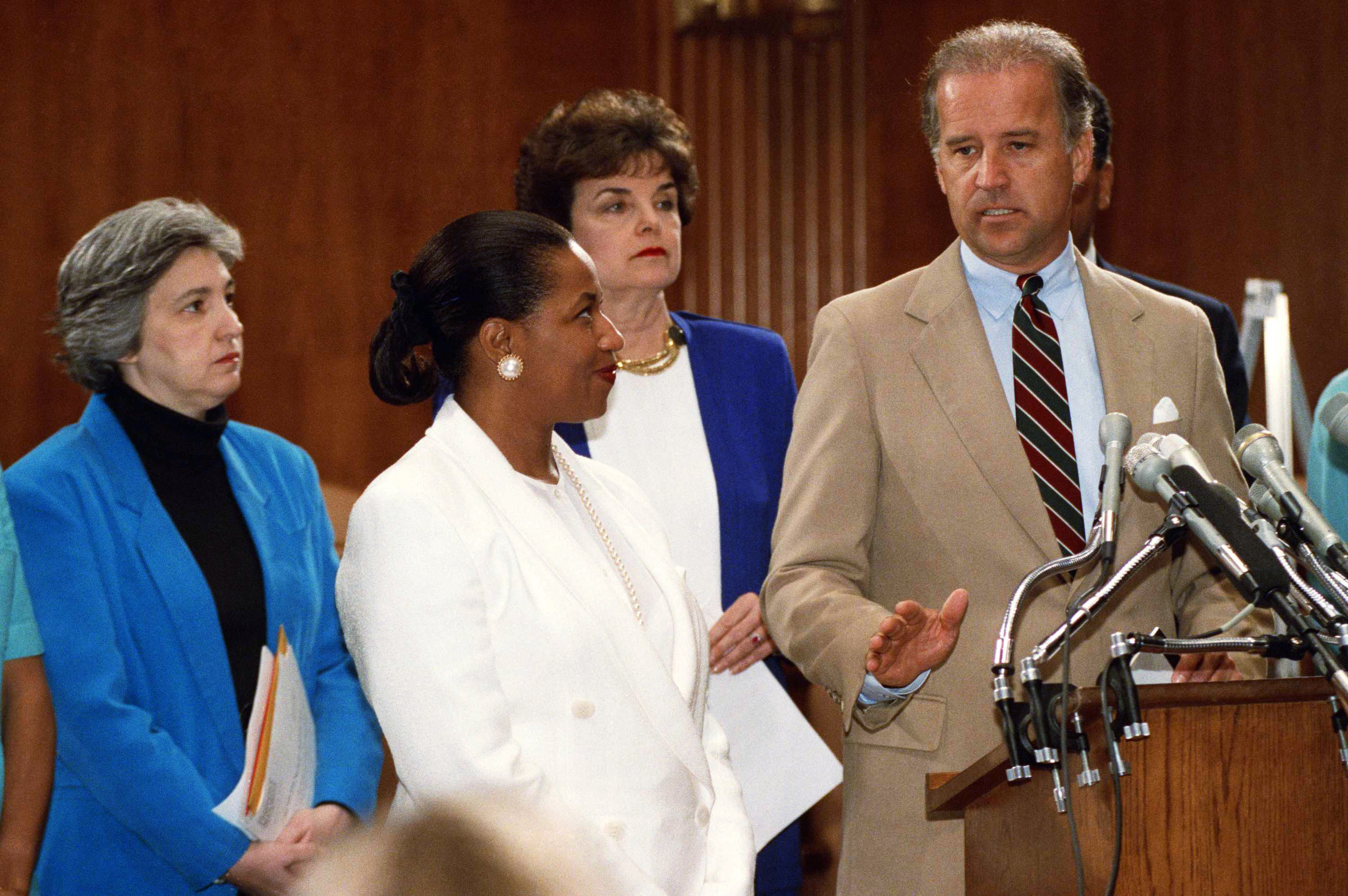
Then-senator Biden in 1993.
Sen. Joe Biden’s office had a good reputation. It was the kind of thing staffers remember talking about in 1993 — a time of cultural upheaval on Capitol Hill, witnessed at close range by the aides who began their careers working for the junior senator from Delaware.
They watched their boss preside over the fraught Clarence Thomas hearings, where Anita Hill’s televised testimony brought sexual harassment into the American lexicon, making employers and employees more aware of the way women were treated at work. They saw Washington constantly waver between old and new — an “old boys network” undergoing a “sea change” as they walked the halls and sorted mail. Working next door to conservative Sen. Strom Thurmond, they remember “a lot of ‘Go fetch me a cup of coffee, darlin’’ type of stuff” — while in their own office, women held senior roles and men took on “menial tasks.”
According to interviews with 10 of the former staffers who worked there at the time, Biden’s Senate office stood out as a professional environment with a close-knit cohort of junior aides, many of them in their twenties, some just out of college. During the workday, they embraced a culture of structure and diligence. Outside of the office, they played softball in the summers and did happy hour near the Capitol at the Tune Inn and Tortilla Coast.
But among their number was an exception: Tara Reade.
The California native, then age 28, was employed as a staff assistant from December 1992 to August 1993, but left little impression on her colleagues at the time. Those who remember working with Reade — and some don’t remember her at all — didn’t know much about her. They described their coworker, largely, as something of an outsider: She didn’t show much interest in socializing with the other junior staffers in the office, or fit their particular mold of a khaki-and-blue-blazered DC professional. Looking back, Reade was a passing figure — an indistinct memory during a time they otherwise recall with vivid detail.

Reade in an undated handout photo
Reade, now 56, came forward this spring with an allegation of sexual assault, claiming Biden digitally penetrated her in an empty Senate hallway when she was asked to bring him a gym bag in 1993. She has said that she also filed a harassment complaint, for which she was retaliated against by being relieved of her duties overseeing interns and put inside a “windowless office,” where she was required to check in and out with a senior staffer.
Biden has denied Reade’s claims and asked the National Archives and the Senate to release any complaints from Reade that exist.
None of the people interviewed for this story — all of whom worked for Biden at the same time as Reade — said anything to disprove or corroborate her central allegation of sexual assault. But in interviews, former staffers questioned many of the same basic aspects of her account, saying they clashed strongly with their memory of Biden’s office culture and of a time of heightened awareness around the treatment of women in the workplace.
One former colleague, Ben Savage, directly disputed Reade’s claim that she left the office as a result of retaliation — saying that she was pushed out over concerns he remembers bringing to his supervisor about her performance.
“Did I campaign against her? No,” Savage said in an interview. “Did I provide honest feedback and complain about her? Yeah, I did. I’m 100% certain it contributed to her getting fired.”
Savage, a California resident who worked as a tech administrator in Biden’s Senate office for three years, said he likely spent more time with Reade than any of his colleagues. He started shortly after Reade, in February 1993. They were the sole full-time staffers with desks in the mail room, an area adjacent to Biden’s reception area on the second floor of the Russell Building, where they worked together on keeping track of the senator’s mail.
In multiple interviews this month, Savage described their relationship as friendly but not particularly close. She confided in him about her personal life, including about a health problem, he said. Yet Savage also found Reade to be a difficult colleague. Beyond small annoyances — he remembered she banged on her keyboard loudly and threw the windows open in the middle of winter — Reade caused repeated problems with the mail program, he said, and struggled to “keep up with the pace and professionalism of the office.”
Savage said he has reached out to a range of news outlets to try to defend his former boss.
Together, Savage and Reade were responsible for parts of the senator’s expansive correspondence program. Any mail that came into Biden’s Senate office — from constituent letters about a problem in Delaware, to petitions for issues like abortion — would be sorted by issue and sentiment, then forward to one of three legislative correspondents who sat in an office downstairs. The legislative correspondents would compose a response on behalf of Biden, often with the help of a policy aide, before passing the drafts back to the mailroom. Multiple people who worked on the mail program, including Savage, said they remember the Biden Senate office made it a priority to promptly respond to every letter he received.
Savage described two main issues with Reade: First, he claimed, she often miscategorized incoming mail. Soon after he arrived, he said, he took over that responsibility himself as a result, developing a new coding and cataloging system on a software called Inter-America.
The second problem came later: When legislative correspondents sent drafted responses back to the mail room, Savage said Reade threw out photocopies of the responses instead of properly filing them, causing a problem in the record-keeping system that made it seem like the mail had gone unanswered. Initially, Savage said, he and his supervisor, Dennis Toner, blamed the legislative correspondents for the problem, until Savage asked Reade about the photocopies, and she told him she had been mistakenly throwing them away, he recalled.
Savage said he took his complaints about her work directly to Toner. He also remembers Toner asking him about Reade’s performance. When reached for comment, Toner said he did not remember Reade, or any problems with the mail program in 1993 — though he did not doubt the specifics of Savage’s account. He recalled Savage as a “disciplined” and “conscientious” employee who helped the office function more efficiently.
One of the legislative correspondents at the time, Cara Ameer (then Cara Nader), said she remembers attending a meeting with Toner and the other legislative correspondents where he addressed problems with the mail program, but made no mention of Reade.
Savage also remembered Reade telling him in the spring that she believed she was being pushed out because of her health issues, an element of his account first reported by CNN. Doug Wigdor, Reade’s lawyer, confirmed she had a health issue at the time, but added that she did not recall Savage well enough to remember specific conversations with him.
Wigdor did not dispute Savage’s account of the mail program, except to say that that the criticism of Reade’s performance occurred in the context of retaliation for her complaining about alleged harassment. By then, he said, she had already raised concerns about at least one alleged incident — where she said a supervisor had asked her to serve drinks at an event because Biden liked her legs.
“It’s not uncommon in retaliation cases for an employee to complain and then to be micromanaged, or nitpicked, and ultimately told, like Tara was, that she wasn’t a good fit.,” Wigdor said.
John Earnhardt, another staffer, said he took over as Reade’s successor in the mail room in April 1993 while she was still on payroll. He said he was never told why the previous person in his role had left, but he did recall a heavy emphasis during his onboarding on not throwing out the mail, though he said the person training him never mentioned Reade.
“I do remember it was like, ‘Hey, this is the job. Don’t throw any mail out,’” Earnhardt said. “I do remember that specifically, like, ‘That’s the worst thing you can do.’”
No one interviewed for this story remembered any incidents of women being harassed or made uncomfortable in the office, nor did anyone remember hearing any allegations about Biden specifically. In more recent years, Biden has been accused of touching women in a way that made some of them uncomfortable. He addressed the issue last year, saying, “The boundaries of protecting personal space have been reset” and “I’ll be much more mindful.”
Reade’s time in the office came after Anita Hill’s 1991 testimony before the Senate Judiciary Committee, chaired by Biden at the time, that left some Democrats deeply unsatisfied with the way Hill had been treated. Biden reportedly expressed “regret” in a phone call to Hill last year for her treatment, though Hill has said she didn’t consider that to be enough.
Decades later, new reporting in the #MeToo era revealed that Capitol Hill was and remains a place where lawmakers set up a system to push harassment or discrimination allegations into a confusing, archaic system of adjudication.
But at the time, those hearings also started a national conversation about women’s treatment in the workplace and ushered in the “Year of the Woman” in 1992, when several women senators were elected, changing the makeup of Capitol Hill.
“There was a sea change,” said David Long, who worked for Biden on the Judiciary Committee from June 1992 to around July 1994, starting as a receptionist. Long described how he had found the Capitol to be an “old boys network” when he arrived in 1991 to work for Sen. Ted Kennedy. “It really became a much more inclusive and equal place, I think, as a place to work.”
Former Biden staffers described their environment as more amenable to women in leadership roles than other offices on the Hill. Some of his senior staffers were women, such as Evelyn Lieberman, his press secretary, or his legislative director, Jane Woodfin. Biden was “ahead of the curve,” Long argued, when it came to elevating women in the office.

Senator Carol Moseley Braun of Illinois, Dianne Feinstein of California, and Joe Biden of Delaware, November 13, 1993.
According to Earnhardt, the staff assistant who replaced Reade, Biden was “very sensitive about women really doing anything for him that was looked [at] as menial” — a sentiment repeated in interviews with other men who worked there at the time. Earnhardt said he was once asked to bring the senator Tylenol or Advil. On the dais during Judiciary Committee hearings, there was an “unwritten policy,” he said, that if Biden wanted a cup of coffee, “a guy had to bring it to him.”
One aide who worked in close proximity to the former senator for decades, including in the early ’90s, said he never heard him comment on a woman’s appearance. There was no “locker room talk,” as he put it.
Reade’s account of the office culture, including her interactions with the senator, differs sharply from those of her former coworkers. While others said Biden almost never interacted with junior staffers, with the exception of an annual staff photo day, Reade has said she remembers seeing the senator around the hallways and him touching her neck and shoulders.
In an email to her lawyer, Wigdor, which he read over the phone, Reade wrote, “I experienced sexual harassment and assault from Joe Biden, so it’s a rather obvious answer that I did not find it a safe and friendly environment for women. It was the opposite of empowerment for me. I felt objectified and after the assault, traumatized with no recourse except the end of my career.”
Former staffers were skeptical about some aspects of Reade’s story, like her contention that she was asked to serve drinks at an event or bring Biden his gym bag, saying that those tasks would not have normally been assigned to someone in her position.
Biden had an assistant, Terry Wright, who handled personal errands for him. He “was the person who schlepped [the senator’s] bags around and accompanied him on the train and made sure that he was where he needed to be at the right time. That was his job. So why would someone else do Terry’s job?” said Melissa Lefko, who served as a staff assistant in the office from August 1992 to August 1993.
Reade maintains that she was asked to bring Biden the gym bag, and through Wigdor, she also recalled once being asked to bring the senator a folder. “She didn’t have a close relationship with [Biden], but there were days that she didn’t see him and days that she did see him,” Wigdor said.
According to Reade’s coworkers, Biden didn’t spend much time in Washington apart from his business on the Hill, and eschewed cocktail parties and after-hours events. He didn’t keep an apartment or a car in DC, largely relying on Wright to shepherd him to and from the Capitol. Former staffers remembered begging their counterparts in the office of Sen. George Mitchell, then the Senate majority leader, for his schedule of the day’s final vote, so they could book the earliest Amtrak from Union Station to Wilmington, Delaware.
Junior staffers embraced Biden’s workmanlike routine: The atmosphere was “very buttoned down, very professional,” said Long. It was not a place where entry-level employees got points for trying to get face time with the senator, or muscle their way into meetings, they recalled. Employees were expected to fulfill their duties, stay in their lane, and respect the chain of command. Time spent in the office was time spent working, they said. “And we worked hard all day long,” said Lefko.
“You were in a professional environment so you wanted to be professional in every way — to look and act that way,” said Cara Ameer, the legislative correspondent.
That ethos of structure and professionalism formed a social fabric for the young people on staff. Reade never joined their circle.
“It was a very, very tight-knit group,” said Long, the staff assistant for Biden on the Judiciary Committee. “We worked incredibly long hours for no money. I knew where all the happy hours were so I could eat for free. I don’t remember her being part of any of that.”
“I don’t have any definitive memories of her,” he said.
Some suggested that Reade simply wasn’t a good fit for the culture of the office, but struggled to pinpoint exactly why they felt that way when they knew so little about her. Two people brought up the clothes she wore to work — specifically recalling that she wore capes and dressed in a “hippie” style — as an example.
“She definitely seemed to me to march to her own drum,” said Ameer. “Maybe she didn’t like us. Maybe she thought we were a bunch of preppy Capitol Hill staffer types. If there was a mold of a Capitol Hill staffer, I would kinda say we probably fit it. We were well dressed.”
Reade’s attorney Wigdor said that while Reade did participate in a few social events such as touch football, she was “private in the office” and most of her friends were outside work, like in Thompson Markward Hall, a dormitory for young women where he said Reade lived at the time.
But Reade also described a class divide between herself and the rest of the staff.
“She felt that most of these staffers and interns went to elite colleges and she didn’t, and they looked down on her, is the best way to describe it,” said Wigdor.
Payroll records indicate that she worked in Biden’s office for a total of eight months. But according to Reade, she was only an active presence in the office for about half that time.

Biden along with Senate Judiciary committee members Senator Dianne Feinstein (center), Senator Carol Moseley-Braun (second from left), and women’s activist Eleanor Smeal, on Capitol Hill in Washington, May 27, 1993.
By April 1993, John Earnhardt had already assumed her responsibilities, quickly befriending the other young people on staff. Earnhardt said he never met Reade or saw her around the office. Savage, her old colleague, said he doesn’t remember telling her goodbye. After Earnheart arrived, he didn’t see or speak to her again.
By Reade’s own recollection of the spring of 1993, she was still in the Senate — working from the “windowless” room, cut off from the rest of the staff.
According to her attorney, she thinks the room was somewhere between reception and the mail room, but she isn’t sure. What she does remember is being moved into a room without windows, only a door, by late April or May 1993, and a telephone and computer were installed for her. She said she was given a “desk audit,” meaning she had to check in with senior staff before leaving the office.
By then, Reade has said in interviews, her job was to “show up and just look for another job.”
Sometime that summer, Wigdor said, Reade stopped coming into the office.
When her tenure as staff assistant officially came to an end weeks later on Aug. 6, 1993 — Reade’s last day on the Biden payroll — few of her colleagues noticed.
“It was a pretty awesome time of life,” said Long, the Judiciary Committee staffer, describing his own memory of Biden’s office in those years. “We worked really hard as a group. We socialized. We knew each other really, really well. All the support staff were really tight and we looked out for each other.”
“And I certainly would hope for Tara that her memories would be good as my own, and I certainly see that they’re not.”
More on tara reade
- Tara Reade Knows She Has A Difficult Allegation. And She’s Had A Difficult Time Getting A Hearing.Rosie Gray · April 30, 2020
- Joe Biden Says Tara Reade’s Account Of Sexual Assault “Never Happened”Henry J. Gomez · May 1, 2020
- Democrats Will Have To Answer Questions About Tara Reade. The Biden Campaign Is Advising Them To Say Her Story “Did Not Happen.”Ruby Cramer · April 28, 2020

Ruby Cramer is a politics reporter for BuzzFeed News and is based in New York.
Contact Ruby Cramer at [email protected].
Got a confidential tip? Submit it here.

Rosie Gray is a reporter for BuzzFeed News and is based in New York.
Contact Rosie Gray at [email protected].
Source: Read Full Article
